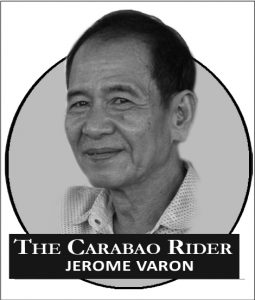“Talagsa ka na makakita sang amo sina nga tawo!” (It’s a rarity to encounter another man like him!)
It’s the reaction of the calamansi vendor at the entrance of the Iloilo Terminal Market when an ambulant vendor refused the monetary token of gratitude from an elderly after returning the cash that dropped from the pocket of the later. 
The owner did not notice he lost his money until he was about to buy a pack of calamansi on his way out. He traced back the way he had been all along looking and searching the pavement for a while before turning around, convinced he could not get the money back as somebody already picked it up.
That was when the ambulant vendor, a skinny man around 40 years of age and obviously strained by the residues of poverty, approached him and asked if he is the owner of the money he found.
The elder man profusely expressed his gratitude and offered a few hundred pesos of the returned amount but the finder parried the hand holding the intended reward, saying simply, “It’s no big deal!”
As the vendor turned to leave, the old man asked for his name. He answered he was Bryan, “Bryan lang!”
The old man stood dumbfounded as he watched the vendor walking away, losing himself in the crowd. When he finally got to his senses, he realized how lucky he was to have encountered a rare kind of man who still valued honesty above anything else. That’s when he heard the calamansi vendor who witnessed and heard the conversation with the ambulant vendor.
It is observed that the personality makeup of every person is largely influenced by the home and family where he grew up, the school which educated him, his community, and his peers. As he gradually picks up on years of his life, these influences leave indelible marks through his experiences and form into layers of his personality. The way he thinks, talks and reacts are products of these dominant influences which ultimately become substantial character traits at the maturity stage.
According to another study, 80 percent of a child’s character is formed by the age of five years. More often, it is at this age that the moral strength of a person gets its foundation through interaction and experience at home.
Unlike other countries in the world where schoolchildren are immediately immersed in the regimented rigors of writing, reading, arithmetic and other subjects, Japan has been following a different kind of approach in their educational system.
In the first three years of school, the lessons are concentrated on manners and conduct, values and decorum. At an early stage of learning, the Japanese educators put premium on strengthening the moral foundation of the pupils on the values of honesty, kindness, respect, obedience and resiliency, among others. These character traits are visibly engraved in Japanese culture, which after centuries have been preserved as treasured attributes of a noble and proud nation.
Dignity and honor are such a precious possessions that the Japanese are just too willing to defend these with their lives. Hence, we know of hara kiri, the voluntary act of ending one’’s life when honor and dignity of a person or his family have to be redeemed.
It is only in Japan where one finds a store without a cashier, the owner trusting the customers to just leave the exact amount for the item he will be bringing out from the store.
It is the country which leaders willingly and graciously adhere to palabra de honor and never hesitate to step down at any given moment when there comes a reason to do so.
Sadly, the Filipino culture has been tattered and soiled through the passage of time. Foreign influences taught the Filipinos to be corrupt, dishonest and greedy, among the many undesirable traits that are visibly present like trademarks of people in the upper echelons of our society. These effectively become standards and norms, identifying those in power and with vast influences as the ones possessing the undesirable traits.
The experience with Bryan is a redemption. There are others like him, though few and far between, to have preserved loyalty to the values they learned from home and other influences in their early life. It is like cool breeze in the scorching summer, if one could describe the feeling of an old man as an afterthought when he finally lost sight of Bryan in the crowd./WDJ

